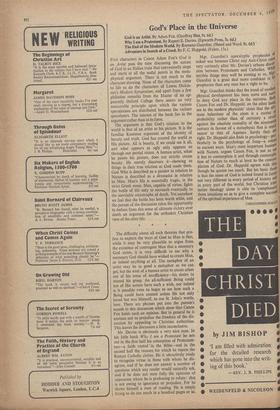God's Place in the Universe
God is an Artist. By Adam Fox. (Geoffrey Bles, 9s. 6d.) Why I am a Protestant. By Rupert E. Davies. (Epworth Press, 7s. 6d.)
FIVE characters in Canon Adam Fox's God is an Artist pass the time discussing the nature of God in an Italian train that conveniently stops and starts at all the nodal points in the meta- physical argument. There is not much to the character-drawing. None of the characters come to life as do the characters of Lowes Dickin- son's Modern Symposium, and apart from a few philistine remarks from the Master of an ap- parently Oxford College there seems no very memorable principle upon which the various speculations are distributed between the various speculators. The interest of the book lies in the argument rather than in its form.
The argument is that God's relation to the world is that of an artist to his picture. It is the familiar Keatsean argument of the identity of beauty and truth. God has created the world as His picture. All is beauty, if we could see it all, and what appears as ugly only appears so through our partial vision. A human artist, when he paints his picture, does not strictly create beauty. He merely discovers it—showing us things in their true relation as God made them. God Who is described as a painter in relation to Nature is described as a dramatist in relation to Man. Man's life is essentially tragic, in the strict Greek sense. Man, capable of virtue, fights the battle of life only to succumb eventually to the inevitable catastrophe of death. Yet somehow we feel that the battle has been worth while, and the parson of the discussion takes the opportunity to deduce from this sense of ultimate victory over death an argument for the orthodox Christian view of the after-life.
The difficulty about all such theories that pro- fess to explain the ways of God to Man is that, while it may be very plausible to argue from. the existence of contingent Man that a necessary God exists, it is very difficult to see why a necessary God should have wished to create Man, or indeed anything at all. The metaphor of an artist may be as good a metaphor as we can get, but the wish of a human artist to create arises out of his sense of insufficiency—his desire to extend his grasp. An all-sufficient Being could not of His nature have such a wish, nor indeed is it possible even to begin to see how such a Being could have created unless He not only loved but was Himself, to use St. John's words, love. There are phrases put into the parson's mouth in this discussion which show that Canon Fox holds such an opinion. But in general he is anxious not to prejudice the freedom of the dis- cussion by appealing to Christian authorities. This leaves the discussion a little inconclusive.
Mr. Davies is obviously a very nice man. In his little book Why I am a Protestant he sets out in the first half his conception of Protestant- ism—a faith rooted ' in the Bible—and in the second half the reasons for which he rejects. the Roman Catholic claims. He is attractively ready to recognise virtue in those with whom he dis- agrees, and if he does not answer a number of questions which any reader would naturally ask, and if he does not state fully the opinions of opponents whom he is professing to refute : that is not owing to ignorance or prejudice. For he shows himself a man of reading. He is simply trying to do too much in a hundred pages or so. Mgr. Guardini's apocalyptic prophecies of naked war between Christ and Anti-Christ coO4 very curiously after Mr. Davies's urbane discus' sion between Protestants and Catholics. W11114 terrible things may well be coming to us, Mgr: Guardini is a great deal more confident in 11 prophecies than any man has a right to be.
Mgr. Guardini thinks that the trend of modal' physical development has been more and moll to deny God any place in the universe. Boll Canon Fox and Dr. Happold, on the other hand see in the modern physicists' claim that the OW: mate behaviour of the atom is a matter 01 probability rather than of certainty a revolt against the absolute causality of the nineteenth century in favour of a metaphysic that is much nearer to that of Aquinas. Surely they all right. Dr. Happold also finds in psychology—par' ticularly in the psychology of Jung—a reel to ancient ways. Man's most important busines with Nature, argues Canon Fox, is not to 10 it but to contemplate it and through contemPla' Lion of Nature to reach at least to the contefF plation of God. Dr. Happold agrees with this though he quotes too much. But his basic thesis is that the sense of God is indeed found in fornis not very different in every period of history and in every part of the world, but Christian trial: tarian theology alone is able to 'complement these intuitions so as to give a complete account of the spiritual experience of Man.
CHRISTOPHER HOLI-15














































 Previous page
Previous page